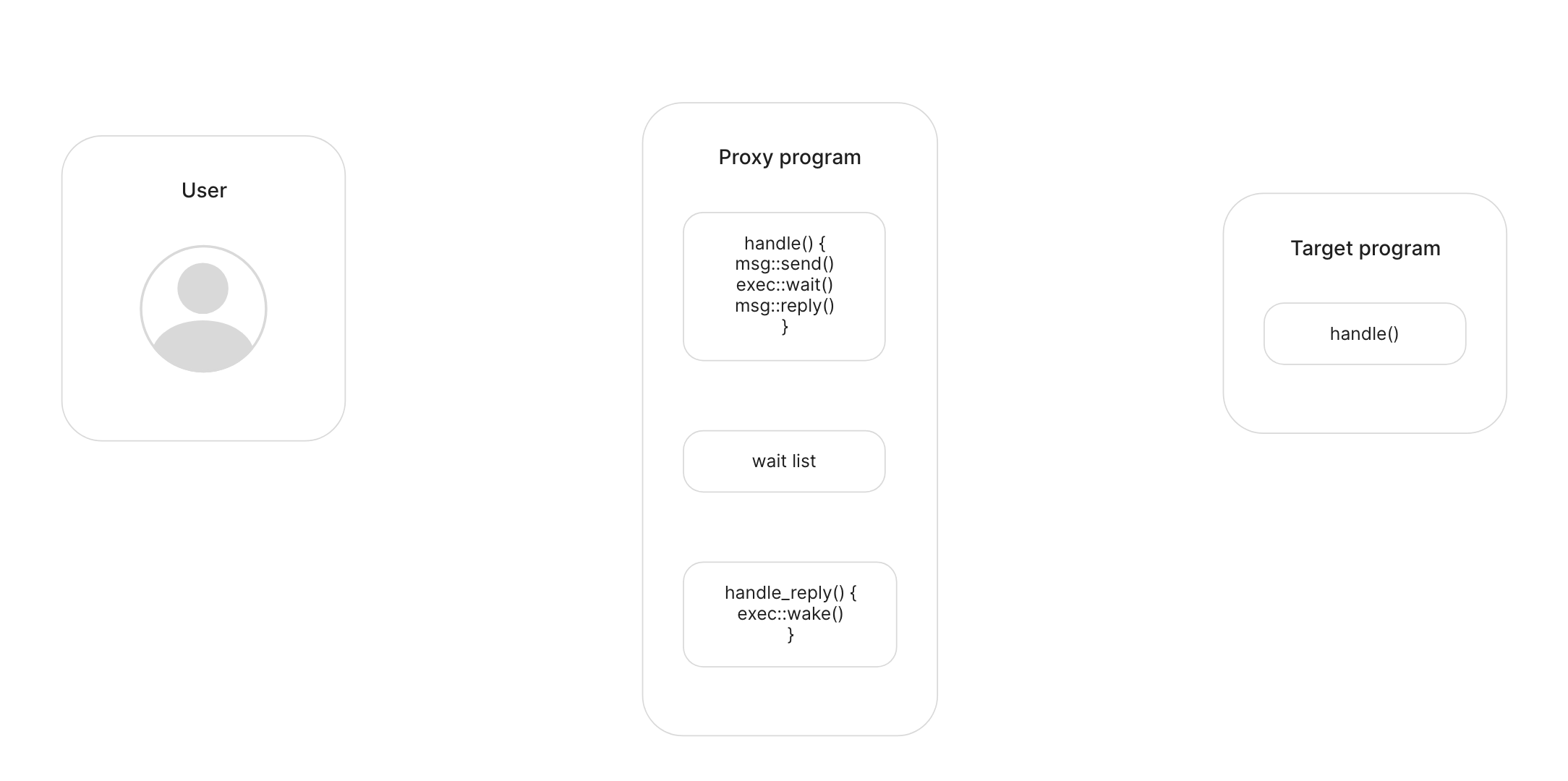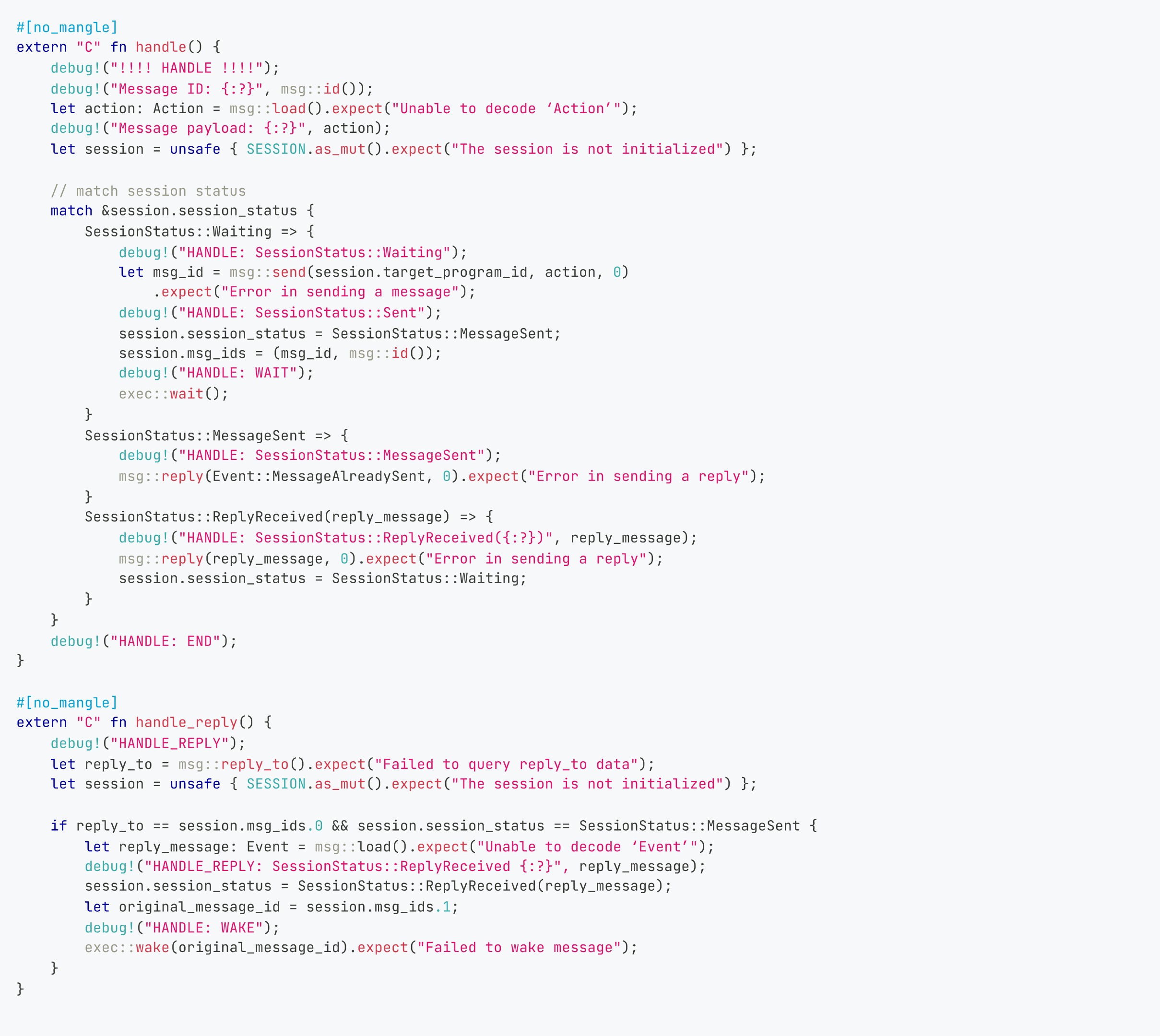Handle Reply with wait() and wake()
Now, let's apply understanding of the exec::wait()/exec::wake() functions to enhance the program introduced in the previous lesson:

The user will now receive a single reply at the end of the entire process, instead of two separate messages.
Proxy Program
Since the Target program remains unchanged, let's take a closer look at the changes in the Proxy program:
type SentMessageId = MessageId;
type OriginalMessageId = MessageId;
struct Session {
target_program_id: ActorId,
msg_ids: (SentMessageId, OriginalMessageId),
session_status: SessionStatus,
}
New fields have been introduced:
msg_ids— a tuple consisting of two elements:SentMessageIdandOriginalMessageId;SentMessageIdis the identifier of the message sent to the target program's address.OriginalMessageIdis the identifier of the message sent to the proxy program by user (required for using thewake()function).
session_status- the session status (required to track the stages of session activity).
enum SessionStatus {
Waiting,
MessageSent,
ReplyReceived(Event),
}
Waiting— the session is in a waiting state.MessageSent- the intermediate session state in which the message was sent to the target program, but the response has not yet been received.ReplyReceived(String)- the session state when the reply message has been received.
With these new fields in the program structure, initialization is as follows:
#[no_mangle]
extern "C" fn init() {
let target_program_id = msg::load().expect("Unable to decode Init");
unsafe {
SESSION = Some(Session {
target_program_id,
msg_ids: (MessageId::zero(), MessageId::zero()),
session_status: SessionStatus::Waiting,
});
}
}
To gain a comprehensive understanding of the process, let's incorporate debugging into the program.
#[no_mangle]
extern "C" fn handle() {
debug!("!!!! HANDLE !!!!");
debug!("Message ID: {:?}", msg::id());
let action: Action = msg::load().expect("Unable to decode `Action`");
debug!("Message payload: {:?}", action);
let session = unsafe { SESSION.as_mut().expect("The session is not initialized") };
// match session_status
match &session.session_status {
SessionStatus::Waiting => {
debug!("HANDLE: SessionStatus::Waiting");
let msg_id = msg::send(session.target_program_id, action, 0)
.expect("Error in sending a message");
debug!("HANDLE: SessionStatus::Sent");
session.session_status = SessionStatus::MessageSent;
session.msg_ids = (msg_id, msg::id());
debug!("HANDLE: WAIT");
exec::wait();
}
SessionStatus::MessageSent => {
debug!("HANDLE: SessionStatus::MessageSent");
msg::reply(Event::MessageAlreadySent, 0).expect("Error in sending a reply");
}
SessionStatus::ReplyReceived(reply_message) => {
debug!("HANDLE: SessionStatus::ReplyReceived({:?})", reply_message);
msg::reply(reply_message, 0).expect("Error in sending a reply");
session.session_status = SessionStatus::Waiting;
}
}
debug!("HANDLE: END");
}
Initially, the session is in SessionStatus::Waiting state. Upon a match, the code switches to the proxy option. The program sends a message, sets the session status to SessionStatus::MessageSent, and records the identifiers of the current message from user being processed and message sent to target program. Then, exec::wait() is called, pausing message processing and adding the current message to the waiting list until exec::wake(message_id) is called or the gas runs out. The ID of the waking message is crucial, hence msg::id() is stored in session.msg_ids.
Moving to the handle_reply() function:
#[no_mangle]
extern "C" fn handle_reply() {
debug!("HANDLE_REPLY");
let reply_to = msg::reply_to().expect("Failed to query reply_to data");
let session = unsafe { SESSION.as_mut().expect("The session is not initialized") };
if reply_to == session.msg_ids.0 && session.session_status == SessionStatus::MessageSent {
let reply_message: Event = msg::load().expect("Unable to decode `Event`");
debug!("HANDLE_REPLY: SessionStatus::ReplyReceived {:?}", reply_message);
session.session_status = SessionStatus::ReplyReceived(reply_message);
let original_message_id = session.msg_ids.1;
debug!("HANDLE: WAKE");
exec::wake(original_message_id).expect("Failed to wake message");
}
}
The condition if reply_to == session.msg_ids.0 && session.session_status == SessionStatus::MessageSent ensures the expected message has arrived at the right moment, i.e., when the session is in the correct status. The status is then set to SessionStatus::ReplyReceived(reply_message), and the reply message is saved. The ID of the original message is retrieved, and the exec::wake() function is called. This function takes the message from the waiting list, and the suspended message resumes processing in the handle() function.
Important note: When exec::wake() is called, and the message returns to the handle() entry point, processing starts from the beginning. The program enters the match again:
// ...
match &session.session_status {
// ...
SessionStatus::ReplyReceived(reply_message) => {
debug!("HANDLE: SessionStatus::ReplyReceived({:?})", reply_message);
msg::reply(reply_message, 0).expect("Error in sending a reply");
session.session_status = SessionStatus::Waiting;
}
// ...
However, this time, it proceeds to the third option according to the session state, sends a reply from the Target program to the user, and sets the status to SessionStatus::Waiting.
Let's review this process as a whole:
